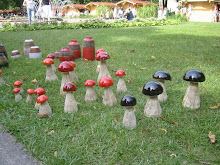I was in Havana last week. With the mix of European and African culture, it is a very interesting and 'colorful' city with so much to do. In fact, it doesn't feel like a 'socialist' country. Yes, most of the buildings are old and run-down. People are poor, earning from around 300 Euros (most workers) to 1000 Euros (those higher up in the Police/Military). You see entrepreneurial activities everywhere to supplement the family income, from the elderly women selling peanuts to the security guards charging an 'admission fee' for entry to museums beyond the official opening hours. But there is a lively rhythm in the air everywhere. Cubans have music and dance in their blood. They feel happy and content. Why?
First of all, very simple, I think it is the weather. It is rather difficult to be melancholic if you have the sun shining on you. I bet there are more happy people in Cuba than in Finland for this simple reason. Second, Cubans and music (and together with it Salsa) are inseparable, and they take great pride in their cultural traditions and influence in the world. We enjoyed so much the cabaret show (the least you will expect from a 'socialist' country) and the Buena Vista Social Club. I even stumbled on the grave of the iconic Ibrahim Ferrer who died in 2005. Havana is a perfect example of how art improves the quality of life and make people truly happy. (And the cigars may also help!) The Cubans also have a good aesthetic sense. Contrary to my perceptions, there are not too many political slogans in the street. Fidel's photo is almost absent. Even if there is political propaganda, it is done in a very artistic way. The Communist Chinese certainly have a lot to learn from the Cubans. Hamel is a must go, with its street art, sculptures, murals and graffiti. The UNESCO preserved old town along the Calle Obispo is an architecture gem. We went to an arts and craft market and happily found some nice paintings.
Third, it is the Government. Yes - I am not kidding. Most Cubans have high respect for Fidel Castro, as he has ended the inequality and corruption of the Batista regime. The Cuban government provides free and good standard education and health care to its citizens. Many university students study science and medicine. One of its major exports is medical doctors to Venezuela - in exchange for oil. Housing is on a 'communal' basis, as people live together in big families across generations. Although Cuba is very poor by Western standard, compared to most Latin American countries, Cubans think they lead a much better life. It is certainly a very different story to the one portrayed by the Americans.
Apart from Fidel, Jose Marti (like Sun Yet Sen of Republic China), Che Guevara and Camilo Cienfuegos are greatly admired. To some people, they are terrorists but to most Cubans, they are like saints. Indeed there is no absolute truth in history. And Fidel is a great orator. He is known for his long speeches but they are so emotionally uplifting for the Cubans. For example, when the Batista Government was overthrown, he said 'for the first time in history, the government will side not with the rich but the very poor.' I still don't have the answer whether bloodshed is essential in a revolution. Similarly when one introduce change in a corporate setting, sacrifice for the greater good is probably inevitable. (To share with you a little secret, the name InnoFoco is inspired by Che's foco theory - fast moving guerillas attacking the establishment from the fringes.)
I love Havana and would like to go back again.
Subscribe to:
Post Comments (Atom)




No comments:
Post a Comment